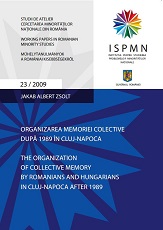Organizarea memoriei colective după 1989 în Cluj-Napoca.
The Organization of Collective Memory by Romanians and Hungarians in Cluj-Napoca after 1989
Author(s): Jakab Albert Zsolt
Subject(s): Military history, Political history, International relations/trade, Politics and society, 19th Century, Transformation Period (1990 - 2010), Inter-Ethnic Relations, Politics of History/Memory, Peace and Conflict Studies
Published by: ISPMN Institutul pentru Studierea Problemelor Minorităţilor Naţionale
Keywords: Cluj-Napoca; Post-1989; Collective memory of Romanians; Hungarians; 1848-1849 Revolution War of Independence; Romanian National Unity;
Summary/Abstract: Transylvania, annexed to Romania in 1920, is a place of continuous Romanian-Hungarian conflicts. There is always a domain of conflict between the Hungarian minority and the Romanian majority represented by the construction, the invention and commemorative use of the past. In my ethnographic and socio-anthropologic analysis I focus on the "memory entrepreneurism", and foreground those interethnic relations and symbolic behaviours that stand behind it in the social context of the multiethnic Cluj-Napoca. The change of regime of 1989 brought along not only a political closure, but also one with on the framework of the imagined past. On the social level this resulted in the drama of the diminuation of belief in the institutions and authorities. The past constructed up to that point naturally lost its political legitimacy. There were two kinds of attitudes emerging within the self-legitimating strategies regarding the past. On the one hand the denial of continuity, the rejection of the past constructed by previous societies in the interest of the new historical order. This new historical order didn't wish to continue the previous economical, social and political relations. But on the other hand, in there was a rising need for historical depth: how can one legitimate the present and create a continuity in the historical space? Nevertheless, the new system considered it necessary to deduce the new social order from history. It had a need for the past also because it defined itself against the past, distancing itself from it: thus the past became surpassed and at the same time an example to follow. The period between 1989 and 2008 proved to be one of the most productive regarding the local construction of memory. Therefore my paper analyses the tendencies of post-1989 past construction. What previously exposed component of the past was made invisible by the new system? What was overtaken and what kind of new components were brought to the surface? What kind of conflicts were revealed, what kind of identity strategies, legitimating processes and national discourses were put into motion by the construction of the (new) memory?
Series: STUDII DE ATELIER. CERCETAREA MINORITĂŢILOR NAŢIONALE DIN ROMÂNIA
- Page Count: 40
- Publication Year: 2009
- Language: English, Romanian
- Content File-PDF

